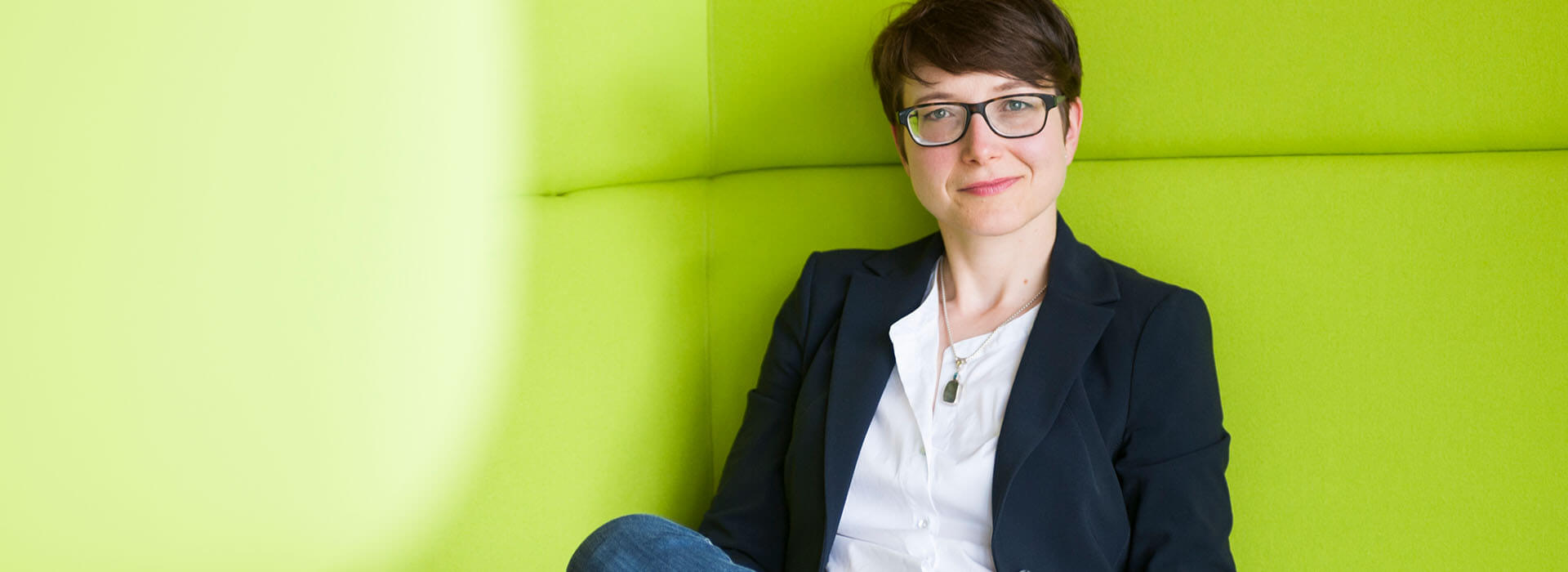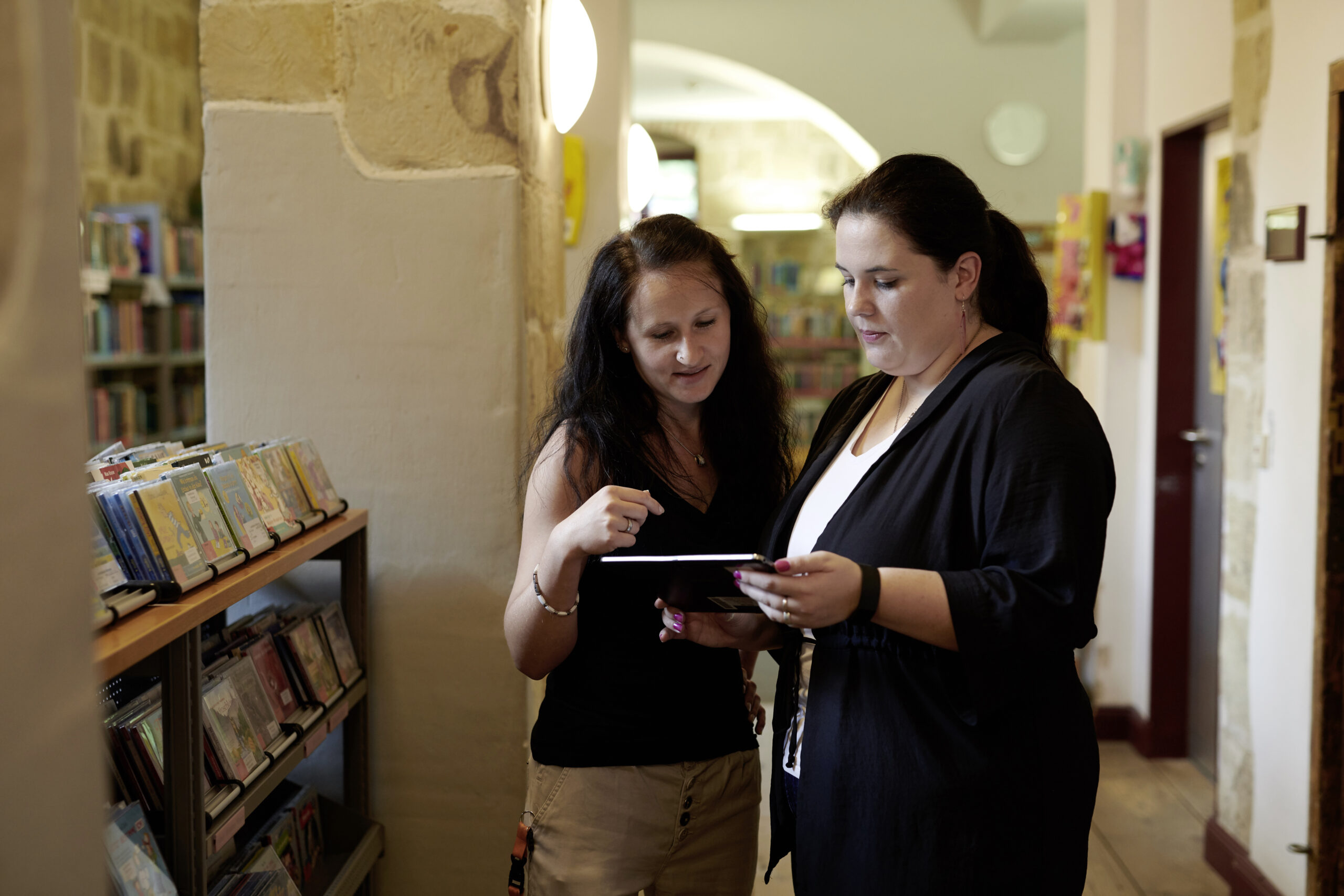
© dbv / Thomas Meyer
Specalization & lateral entry into the library world
Start a new chapter –
shape the world of tomorrow.

Your way to the library: as a specialist: in
or career changer: in
Get off to a great start professionally in your library and create added value for everyone
The professional field of library offers employees: inside a diverse and varied area of responsibility in a dynamic environment. In the sign of freedom of information and justice, libraries enable all citizens: inside access to media, data, information and knowledge. They offer valuable services for science, research, training and further education as well as the development of personal interests.
Whether as a specialist: in or in a career changer: In - in the library you can bring your professional skills specifically or take completely new ways. As a specialist: In use your qualifications, for example from areas such as marketing, IT or personnel management, and work in these specialized roles within the library. As a career changer: In you have the opportunity to switch to library tasks and reorient yourself professionally, even without prior training in library. Various training and retraining options are open to you, such as a further education master, traineeships or the expert examination.
Regardless of the way you choose the library world - we look forward to your commitment and fresh ideas!
Fach expert: Inside & career changer: Inside: Relevant degrees and possible uses in libraries
Libraries are versatile places of work that increasingly rely on interdisciplinary expertise. Whether you are a specialist: In your knowledge in special areas or as a career changer: in new ways, there are excellent opportunities for both ways. You either qualify you for subject -specific tasks or make it easier for you to get started in library activities. In the following you will find an overview of possible study and training qualifications that can be relevant in libraries:
Buchbinder: In, restorer: in
- Area of application: conservation
- Example: bookbinding or restoration workshop in large libraries with a historical inventory
Bookseller: In
- Area of application: existing structure, advice, reading promotion
- Example: purchase and maintenance of book stocks, reading advice
Content management (not directly a degree, but relevant as a department)
- Area of application: social media management, digital public relations work
- Example: conception and care of social media channels, digital communication
Diversity management
- Area of application: inclusion and diversity in libraries
- Example: Development of programs to promote diversity
Retailer / hotel management
- Area of application: service orientation, reception, simple administrative activities
- Example: reception area, support in the library organization
photography
- Area of application: digitization projects, image archiving
- Example: Head of digitization bodies
Humanities
- Area of application: specialist department, scientific library work
- Example: specialist work, management of a specialist library
IT experts, software developers: in
- Area of application: IT infrastructure, database management, research data management, digital services, digital humanities
- Example: maintenance of library software, management of digital resources, development and mediation of software solutions
Culture management / cultural and media education
- Area of application: libraries as extra -curricular learning locations, event management
- Example: conception and implementation of cultural events, development of communication strategies
Marketing, communication science, media design
- Area of application: public relations, image maintenance, user acquisition, social media, event management, web presence
- Example: Development of marketing strategies, user acquisition, design of materials for public relations
Mediävistik, Latinistics, History, Book Sciences etc.
- Area of application: historical collections, provenance research, preservation
- Example: Head of special collections (manuscripts and old prints), work in manuscript centers or subsequent exposure projects
Media education
- Area of application: promotion of reading, media and information competence, conception of educational offers
- Example: Teaching Library, development of didactic programs
Musicology
- Area of application: curating of music stocks
- Example: Head of a music library, inventory in the field of music
Natural sciences, mathematics
- Area of application: specialist department science
- Example: Head of the Open Science Office, specialist work, management of a specialist library
Office / office management
- Area of application: Directorate assistant, office organization
- Example: appointment coordination, office organization
Personnel development
- Area of application: further and further training organization, strategic personnel development
- Example: recruitment, further training for changing professional fields
Political science
- Area of application: democracy education, information competence, fake news prevention, international
- Example: implementation of workshops and class tours
Social pedagogy / social work
- Area of application: library education, participation and participation of children and adolescents, district work and cooperation management
- Example: dealing with conflict situations, moderation of rooms, networking in the district
Event clerks
- Area of application: planning and implementation of events in libraries
- Example: organization of readings, workshops, exhibitions
Administrative sciences
- Area of application: project management, administration, financing applications
- Example: project applications and administrative tasks
Further education master's degree
Lateral entry into librarianship through a course of study is open to graduates with a bachelor's, diploma or master's degree as well as people with a comparable degree via a so-called continuing education master's degree program. In order to gain access to this professional field, certain professional experience in the library sector is required.
Depending on the university, the master's degree can be acquired as part of a full-time or part-time continuing education course. This course of study usually requires a fee.
Further education master:
- Library and Information Science: HU Berlin, Institute for Library and Information Science
- Library and Information Science: TH Cologne, Institute for Information Science
- Digital data management: FH Potsdam in cooperation with the Institute for Library and Information Science at HU Berlin
- Library informatics: TH Wildau, Wildau Institute of Technology
- Contact study program in library and information management: HdM Stuttgart, continuing education center
Further education/certificate courses
Certificate courses for lateral entry offer scientifically sound and application-oriented further training in thematically and organizationally self-contained modules. These courses are internationally recognized and are offered at various institutions. They are characterized by their scientific foundation and are tailored directly to the requirements of professional library practice.
Further training/certificate courses:
- Center for Library and Information Science Continuing Education (ZBIW) at the TH Cologne
- Contact study program in library and information management: HdM Stuttgart, continuing education center
- Basic knowledge library for career changers and those who want to become one: Further education center at the FU Berlin
Traineeship / traineeship
Of course, interested career changers can also apply to the advertised legal traineeships and volunteers. In the case of the legal clerkships, it is particularly important to pay attention to the age limit, since a temporary civil servant is civil servant. Otherwise, the same conditions apply to people with completed studies and professional experience in other areas as for the other applicants: inside. It is not uncommon for career changers to be set: inside and acquire the library qualification "On-the-Job".
- Here you can find further information about the traineeship and the training libraries .
- traineeship and the training libraries here .
FaMI: retraining & shortening of training
Are you thinking about pursuing a degree as a specialist in media and information services (FaMI) with a focus on libraries? There are various routes, including a regular 3-year apprenticeship, which can be shortened to 2.5 years under certain conditions. Alternatively, you can take a retraining measure where you can complete a full-time course at a training provider such as Berlin Information and Documentation or North Rhine-Westphalia Medical Documentation. This usually includes an internship lasting 6 to 12 months.
Another option is an individual company retraining measure in a training institution, often in cooperation with an educational provider. The examination is carried out on the basis of a retraining examination regulation, if available, or in accordance with Section 45 BBiG (admission in special cases). Problems in teaching theory can arise, and in such cases it is the responsibility of the educational provider to find solutions. Ideally, theory is taught in a vocational school, but this is not always possible due to capacity restrictions. In such situations, you can switch to another school location, or the educational provider can provide suitable lessons, taking costs and quality into account. It is also important to coordinate the timing of the measure with the relevant examination dates.
You can find further information about shortening your training and retraining here:
External examination for unskilled workers
If you have no formal training but have worked in a library for at least 4 ½ years, it is possible to take the external examination in accordance with Section 45 (2) of the Vocational Training Act. This means that you will be admitted to the exam if you can either prove that you have completed one and a half times the required training time in your profession or can convincingly demonstrate in another way that you have acquired the necessary professional skills.
Preparation for the exam can be done through self-study, but part-time preparation courses show greater success. Appropriate offerings are available in the library department:
Bridge course for training/study qualifications acquired outside Germany
The bridge course "Arriving in library work in Germany" is aimed specifically at specialists with a foreign library-related studies or professional experience that have knowledge of German at least B2 level. The central goal of this course is to make it easier to get started with the Library and Information professional field in Germany. In the course of the bridge course, you have the opportunity to adapt your qualifications to the requirements of the German library system. You will be familiarized with the specific working methods and standards and you can acquire the necessary skills to work successfully in German libraries. You can find more information here.
Internship, volunteer service, volunteer work
Your job library that moves you
IT, AI, robotics, customer service, events from 0 – 99, social media, PR… We have more than books
Your Bib: Dynamic, innovative, globally networked & center for knowledge preparation and preservation
We value and support you with all your facets and special features
We live democracy, sustainability & digitalization
We are your safe employer in often uncertain times
Your work-life balance is important to us
Voices of our lateral entrants: Inside & FachExpert: Inside
Become a hero, work in a library!
- You enable participation in social and academic life
- You enable exchange, encounters and networking
- You offer commercial-free offers for a diverse society
- You create access to knowledge by curating, developing and providing information in a needs-based and professionally qualified manner
- You open spaces for shared learning and research and provide advice on the learning, teaching and research process
- You open up spaces for encounters and cultural experiences
- You enable professional and cultural education through events and offer a meeting place for discourses and debates in science, culture and society
- You promote the development of skills of library visitors
- You preserve knowledge and cultural assets in digital and analog form
- …
FAQ BIB TRAINGING AND THE FACHE expertise
What skills and experience do I need in a library?
A library requires a diverse range of skills to inspire and support people in their search for knowledge. The key to this is not only interpersonal skills, but also a strong service orientation. Regardless of the size of the library, didactic-pedagogical knowledge and skills in the areas of IT and data are crucial in order to implement innovative services. Through continuous training, you can ensure that you are always up to date and meet the changing needs of library visitors.
What areas of work are there in the library that could be relevant to my qualification/degree?
Depending on your qualifications, exciting opportunities open up in various areas within libraries. With pedagogical skills, you could conduct user training and internal employee training. IT and data management qualifications enable you to manage databases and digital resources. Research support experience in information gathering and management is valued. Legal knowledge is valuable for questions relating to copyright and license management. Event management, marketing and communication skills enable the creative organization of events and the promotion of library activities. Digital archiving skills are in demand when managing electronic resources. But ultimately it depends on the exact requirements of the library and the advertised positions. It's worth checking job advertisements carefully to find the perfect match. Click here for the job advertisements.
What are the relevant degrees for career changers: inside & specialist: inside in the library system of importance?
There are a variety of relevant degrees for both groups that can make it easier for you to get started into the library world. This includes, for example, degrees in media education, social pedagogy, cultural management, IT, humanities, marketing and administrative sciences. These qualifications offer valuable knowledge and skills that are useful in various areas of library work.
What career opportunities are there within the library sector?
There are various career paths available in the library sector, depending on your qualifications and interests. As you gain experience, you can advance to management positions such as department management, project management or library management. The growing importance of digitization also creates opportunities for IT specialists and digital curators who deal with the management of library software and databases. University graduates in library and information sciences can work in research, teaching or specialized library areas. Librarians with teaching skills can work as education officers to develop training programs for staff and users. Your individual development in these areas depends largely on your qualifications, interests and professional goals. You can also positively influence your career prospects through further training and specializations.
Find out more about further training and career opportunities in librarianship here.
Which libraries are near me?
There are more than 8,850 libraries in Germany. To find out which ones are in your area, you can use the BIB's DAPS database of training centers, internships and study opportunities in the areas of archives, libraries and documentation . Here you have the option to search specifically for postal codes. member search of the German Library Association (dbv) offers a practical option. The job portal BiblioJobs also has a map function that can help identify libraries in your area. Of course, you can also use the usual job portals to search for suitable library positions in your area.
How much do I earn as a librarian
The content of a librarian: In is influenced by various factors, including the location, the type of library (e.g. public library, university library, special library), professional experience, qualifications and the level of education. It is important to emphasize that salaries can vary significantly depending on the country and region.
In Germany, the entry -level salary for specialists is around € 33,000 and for librarians: inside, depending on the state and tariff, around 40,000 euros per year. Experienced librarians: Inside or those in higher positions can expect salaries in the range of 50,000 to 60,000 euros or even more.
Since in most cases it is a job in the public service, additional advantages such as "Christmas bonuses" or aid eligibility are often added. The overall package makes the career as a librarian: not only fulfilling, but also offers attractive financial perspectives.
What advantages does a job in the public sector offer me?
A job in the public sector can offer numerous advantages.
You benefit from high job security and long-term stability, as public institutions are often less affected by economic fluctuations. In addition, the public service offers generous social benefits, including health insurance, pension plans and other benefits, as well as family and leisure-friendly working time models. The collective bargaining regulations in the public sector, which provide clear guidelines for salaries, working hours and other working conditions, promote transparency and fairness.
Care is taken here to ensure that every person, regardless of gender or religion, deserves the same. There are also a wide range of further training and further education opportunities available, with which you can continually improve your qualifications. Last but not least, a job in the public sector offers the opportunity to make a direct contribution to society. Here you can provide public services for citizens or science - a fulfilling professional perspective for many people.
What steps do I need to take to prepare for this change?
Are you planning a lateral entry into the library world? Fantastic, we are looking forward to seeing you! You can make the upcoming change positive in the following ways:
Find out more about librarianship by using the information available on our website and perhaps by stopping by your favorite library. Check whether there are opportunities for you to take part in appropriate courses or further training in order to meet the formal requirements in the library sector. You can also look for internships, volunteer work or part-time work in libraries to gain practical experience and gain an insight into everyday working life. It can also be useful to build a professional network by joining professional associations and networks, attending events, and making contacts with people in the library industry. Tailor your application documents to the requirements of the library sector, highlighting transferable skills from your previous professional background and clearly showing that you are interested and committed to a career in librarianship.
German is not my native language. What support can I expect so that I can quickly take an active part in library life?
If German is not your native language and you would like to enter library life as a career changer, there are several supportive measures that you can consider.
For example, it is possible to attend language courses at adult education centers, online or through local language schools.
A solid basis in the German language is crucial in order to be able to communicate effectively in everyday library life. Also ask your future library about a structured onboarding program .
Such a program not only offers a comprehensive introduction to the library's operations and processes, but can also include training in subject-specific language. Take an active part in communicating with your future colleagues and openly discuss your needs and intentions. Most people will be understanding and willing to help you. Open communication not only creates understanding, but also promotes a supportive work environment that makes it easier for you to enter library life.

© 2024-2025 MEIN JOB BIBLIOTHEK | Contact
| Imprint | Data protection My job library - a joint project of the associations:






